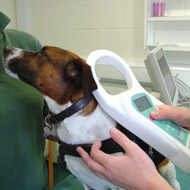Welsh Government seeks views on dog microchipping

"We are now asking for views on some of the more technical aspects of how this would work in practice with a view to bringing in compulsory microchipping in spring 2016."
A public consultation on plans to introduce compulsory microchipping of all dogs has been launched by the Welsh Government.
The Welsh Government initially consulted on microchipping all dogs in Wales in 2012. Specific technical details including who is able to chip dogs, what information should be recorded and how, have needed further discussion before legislation could progress.
In a statement this week, Welsh deputy minister for farming and food, Rebecca Evans, said: "When we originally consulted on introducing compulsory microchipping, 84 per cent of respondents supported the idea. We are now asking for views on some of the more technical aspects of how this would work in practice with a view to bringing in compulsory microchipping in spring 2016. This is in line with the date for both England and Scotland."
"Until then, I encourage all dog owners in Wales to microchip their animals. Dogs that are chipped are far more likely to be returned to their owners if they are lost or injured. Dog owners wanting advice on the benefit of microchipping should contact their local veterinary surgeon or qualified implanter."
The Welsh Government's decision to introduce compulsory microchipping is just one aspect of their work to improve dog welfare. In 2012, they legislated to ban electronic shock collars and from 30 April, 2015 new standards will be introduced for licensed dog breeders.
The consultation is now open and closes on 10 May. To respond, visit: www.gov.wales/consultations



 The veterinary mental health charity Vetlife is inviting the veterinary community to join it for a sponsored cold-water dip.
The veterinary mental health charity Vetlife is inviting the veterinary community to join it for a sponsored cold-water dip.